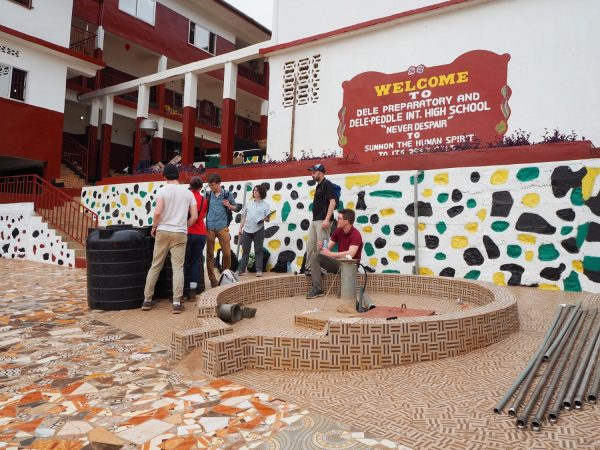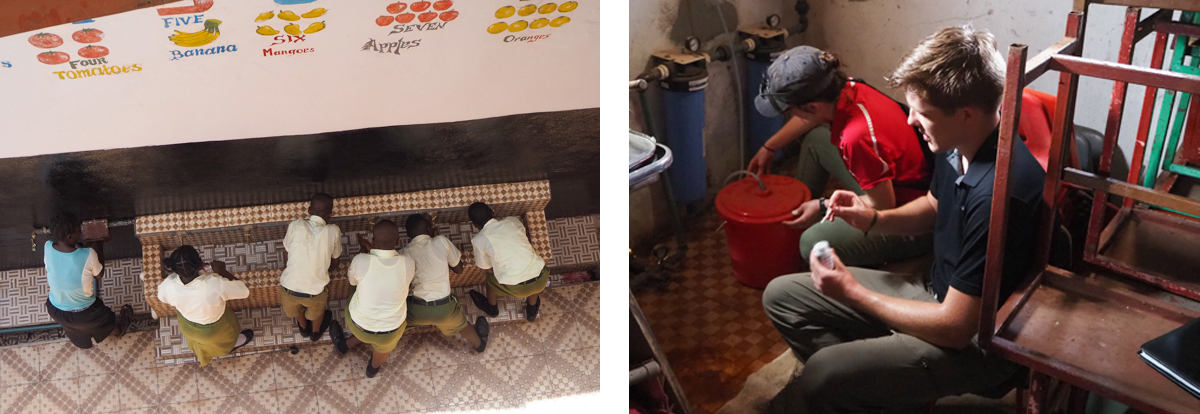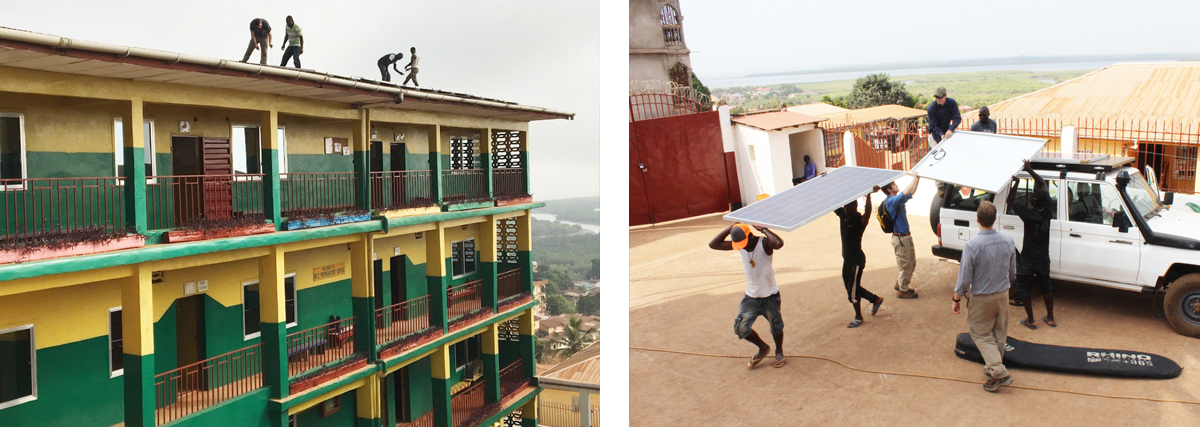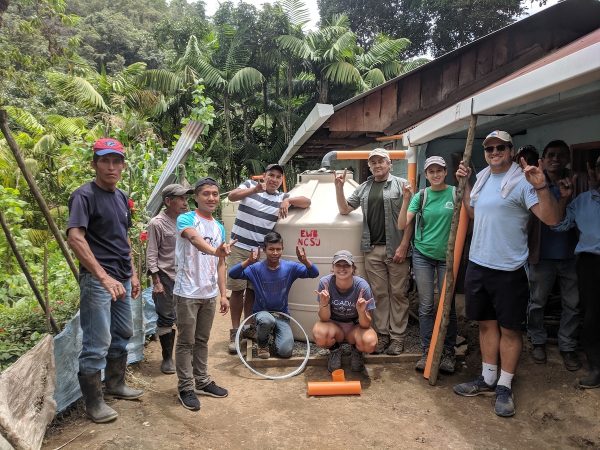The NC State Chapter of Engineers Without Borders (EWB) has 3 teams that have been working on projects with international partners in recent years including two teams in Sierra Leone and one in Guatemala. Following is an account of how they are completing their work despite challenges resulting from COVID-19.
Travel bans bookmark the work in Sierra Leone
In early March, at the beginning of spring break 2020, seven students and their professional mentor left Raleigh headed to Sierra Leone, on the west coast of Africa. For almost a decade, the Sierra Leone Clean Water and Renewable Energy teams have been working on projects at the Dele Village School in Lower Allentown, a small city close to the capital of Freetown. This trip was one of many for the long- running projects to provide water and power to the school that serves about 700 students. Both teams intended, with this final trip, to monitor the implemented systems, troubleshoot any problems, and then close-out the projects.

“Everything was working great. The hand washing stations were getting even more use since everyone was on guard about the coronavirus,” said Taylor Robertson, a junior in CCEE and member of the Clean Water team. The team performed several tests including a well drawdown to measure the water level between the static level and the pumping level, chlorine testing and coliform testing. The most crucial monitoring task for the renewable energy team was to optimize the system for both the dry and wet season in Sierra Leone. This meant finding the optimal charging algorithm for the solar system for different conditions. The group was pleased to find that the renewable energy system, which includes solar photovoltaic panels and a battery storage system, was working even better than expected, powering the school fully even during the rainy season.

Students were seated in the front section. L to R: Cedric Clyburn, Todd Bean, Jennifer Woods, David Mulcahy (the team’s professional mentor), Connie Feinberg, Taylor Robertson, Evan Grant, and Quentin Sieredzki.

For both teams the work in Sierra Leone has presented some unusual challenges along the way. Both the initial and final phases have been book-ended with travel bans based on life threatening virus outbreaks. First, the Ebola outbreak meant that after their initial assessment trips, before they were able to return with the first phase of implementation, a travel ban blocked their return between 2014 and 2017. Amy Butler, a senior in CCEE and Vice President of Chapter Development for the NC State student chapter, noted that there were both negative and positive things that came of the travel delay. “Because many members of the original teams graduated during the travel ban, when we finally were allowed to go, it was almost like starting over. But, on a positive note, because we had so much time, we were able to improve upon our engineering designs, especially in regard to the solar system the renewable energy team was conceiving,” Butler said.

“Everything can change in the blink of an eye”
The 2020 Spring Break trip offered a chance for closure on a long, successful, and educational endeavor on the part of the NC State EWB chapter. They had plans to spend the last day of work visiting two more schools in Sierra Leone where there is potential for replicating some of their work in coming years, and there was a day for sight-seeing in the villages and the city. Unfortunately, closure came in a different form.
“It was 2:00 am on Thursday March 12th. We were all sleeping in a small guest house, and only a couple of people on the trip had internet service on their phones. When they got the news of the impending travel ban, they woke up the whole house, and we spent the next several hours figuring out how to get home,” Robertson said. “Within 24 hours, we went from having three days left to finish the project to getting on a bus in the middle of the night to catch a ferry to get to the airport.”
“We all got a lesson in remembering that everything can change in the blink of an eye. Conner Borkowski, who is Vice President of Projects in our NC State chapter of EWB, got an email from EWB International contacts. We were both in New Hampshire on a mountaineering trip with NC State. We were in a hostel, and headed out into the wilderness where we knew we would not have internet service. The next few hours were a frenzy of emails and phone calls. One of my strongest impressions is how committed the people at NC State were to making sure the students got home safe.” Amy Butler, CCEE Senior and VP of Chapter Development
Dr. Andy Grieshop, the faculty advisor to the EWB student chapter had just returned to his sabbatical in Sweden from a research trip to Zambia and Malawi. “I was giving as much guidance as I could thru email, but it was mainly the folks in the College of Engineering, including Shelly Hoover-Plonk and Jerome Lavelle, along with the travel agent who eventually figured out how to bring the team home,” Grieshop said. ” I think the students and their mentor David Mulcahy acted prudently and calmly in figuring out the logistics.”
Institutional Memory
The Sierra Leone teams are now in the process of documenting their decade of work on the project and closing out paperwork with EWB-USA, the national ‘parent’ organization. They were able to quickly visit two other schools during their last day in Lower Allentown, where they may potentially begin a new project in coming years.
“One of the things that the delays from Ebola, and this latest unusual circumstance, taught us is that keeping detailed notes about the project and the progress is very important,” Robertson said. “When the Ebola crisis caused our team to have a three- year delay, it was almost like starting all over again when we got the go-ahead in 2017. By then, most people who had been on the original team had graduated. There was no institutional memory. We are going to make sure we avoid that this time.”
Building on Successes during a time of Uncertainty
The chapters’ third team, Guatemala Water Systems (GWS), has been working in the small Mayan village of Caserio Panhux, Guatemala since 2017. You can read past coverage of their work here. The GWS team is also trying to finalize their project while working around the challenges presented by COVID-19.
In 2017 the team took their assessment trip, and have since returned three times to install water catchment systems on all the houses in the village. Carter Rucker (BSCE 2018, MSCE 2020) who was able to go on each of those trips and was planning to go on the trip that was planned for early in May 2020, offered his perspective. “Fortunately, the community members have been very involved, and we’ve worked closely with CeCEP the whole time, so we think we can successfully oversee the final round of installation using email and other digital communications,” Rucker said. CeCEP (Centro Comunitario Educativo Polomchi) is a local non-governmental organization the chapter has worked alongside to complete the work, exchanging information about engineering design and implementation and navigating different cultures and regulations. To fulfill their commitment to the project despite the travel restrictions, the current plan is for the chapter to help oversee remote implementation of the final systems. “We plan on creating very detailed diagrams and creating plenty of documentation to help them with the installations that are left to do,” Rucker continued. “We’ll be communicating with them in real-time as they install the last few systems.”

To date, the team has installed about 50 rainwater catchment systems, which consist of 1700-liter tanks and the associated hardware needed to catch and disperse the water. Recently, CeCEP, who checks on the systems regularly, has reported that many of the spigots that came with the tanks are leaking. The team is now looking into a different type of tap to replace the leaking spigots. The final phase includes 8 homes and the community school. Once travel restrictions are lifted, the team hopes to return one last time for a monitoring trip.

